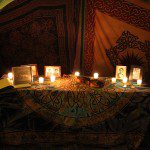 I was standing by the fire at Saturday’s Samhain ritual, a ritual that was clearly not going according to plan. But those of us who were leading it recognized that something special was happening and had the good sense to go with it. It was a memorable evening, even if it was very, very long.
I was standing by the fire at Saturday’s Samhain ritual, a ritual that was clearly not going according to plan. But those of us who were leading it recognized that something special was happening and had the good sense to go with it. It was a memorable evening, even if it was very, very long.
Although I knew this was a good thing, I couldn’t help thinking about the participants who had planned to be there for one hour and were now starting their third hour. What were they thinking? What were they feeling? Had they lost track of time, caught up in the power of the Gods and ancestors? Or were they simply too polite to get up and leave?
My mind went back to a time when long religious services were a regular thing in my life – a regular thing I found troublesome on many counts.
As I’ve discussed before, I grew up in a small fundamentalist Baptist church. The minister (“don’t call me a minister – I’m a preacher!”) had not graduated from high school. His passion for his God and his faith were strong and he – along with most members of the church – assumed that passion was the only true marker of real faith.
There was no order of service. My father was the choir director (more of a song leader, considering the choir never practiced) and he would pick out music ahead of time, but everything else was done on the fly. Planning was viewed as “trying to control God” and anything other than extemporaneous prayer was simply not permitted. The preacher might have an outline of what he wanted to say, but most Sundays he would simply read a few verses from the Bible and start talking about them.
Most people who don’t speak in public regularly think unplanned, unrehearsed talks are short. I mean, you don’t know what you’re going to say, so how could you talk for very long? In practice, the opposite is almost always true – extemporaneous speeches take far longer than you expect. Even in the very orderly UU church, it’s a challenge to get people who need to make announcements to write them out ahead of time. If they don’t, what should be a concise 30 second announcement becomes a rambling 2 minute talk. Really good speakers are the exception, but those folks are rare, and I’m not one of them.
All this lack of preparation meant services ran long. Very long. I was envious of my friends in more orderly churches whose 11:00 services ended regularly at noon. These services usually ran till 12:30, and occasionally they would approach 1:00. “Let the Spirit lead!” was the response to anyone who complained about the length.
Even this skeptical universalist Pagan-to-be could recognize that sometimes the Spirit really did lead and letting things continue till their natural conclusion was the right thing to do. But just as you can’t control the Spirit with a detailed liturgical script, neither can you control the Spirit – or the Gods and ancestors – with intentional unpreparedness. The majority of those services were disjointed, uninspiring, and downright unpleasant.
How fundamentalist churches conduct their services has not been my concern for many years. But I see some of this approach in the Pagan world and it bothers me. I see Pagans who put little thought and even less preparation into their rituals. I see Pagans who think “speaking from the heart” means “say whatever pops into your head at the time.”
At the core of this problem is a basic logical fallacy: correlation does not imply causation. It is true that many good rituals are long, but that doesn’t mean long rituals are automatically good. It’s also true that powerful rituals frequently go off-plan. But it doesn’t follow that unplanned rituals will always be powerful.
And why would we think they would? Perhaps that kind of thinking can be excused in a religion that teaches their God controls everything, but our Gods expect us to do our part. “Doing our part” means studying and practicing and learning our traditions. It means putting in the work up front to make things right. It means being aware of what might go wrong and taking steps to prevent problems. It means following a liturgy that has been proven to work in our traditions – Wicca for Wiccans, Druidry for Druids, Hellenism for Hellenists, and so on.
Writing 1700 years ago, the Neoplatonist Iamblichus said:
it is necessary that the prayers of the ancients … are preserved ever the same and in the same manner, with nothing of alternative origin either removed from or added to them. For this is the reason why all these things in place at the present time have lost their power, both the names and the prayers: because they are endlessly altered according to the inventiveness and illegality of the Hellenes.
I’m not quite that conservative in my approach – I think a little inventiveness is a good thing. But good innovation is grounded in a knowledge of existing practices. It brings mindful changes to proven methods, not “throw it against the wall and see what sticks.”
There’s another, more subtle problem with unplanned rituals – they can lead to laziness. If the Gods and ancestors showing up and taking over is what makes a great ritual, then let’s just let them do all the work, right?
Saturday’s Samhain ritual involved months of planning. It involved countless hours of ritual writing and editing, promotion with flyers and e-mails and social media, and a dozen people doing hours of some very physical work to set up the Temple of the Ancestors and the Temple of the Oracle. And let’s not forget the work our Oracle put in, both in preparation and in serving as a messenger. Take any of that away and does this great experience happen at all?
I do not know the minds of the Gods and ancestors. Perhaps our preparations made it easier for them to connect with the people in attendance. Perhaps they saw the work we put into it and decided to show their appreciation. Perhaps they have some other reason known only to them. I don’t know.
But I do know this. Recognizing a miracle is a beautiful thing. Counting on a miracle is a recipe for failure.
So for those who stayed for the whole thing and for those who had to leave early, know that this was a very special evening and you were a part of it. We’ll remember its power and beauty for a very long time. But we won’t cling to it, or try to duplicate it… and I expect Winter Solstice will be back to our usual 45 to 50 minutes.













